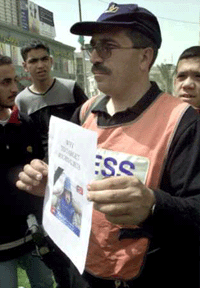
The wall goes on and on and on...
25 April 2003
“The wall is no secret. Even if people have not visited Qalqilya and Jayyous, the story is there in the newspapers. Or here, on this website. The people of Qalqilya are locked in a prison. There is only one way out, and few have permits to leave so as to find work elsewhere. Half the farmland is now gone and vital water supplies have been cut off. Palestinians do not have the permission to dig for more water. Israel is unilaterally setting boundaries, with no negotiation, no court of appeal. ” Isabelle Humphries revisits the concrete embodiment of Israeli impunity near Qalqilya and reports on the abuses suffered by farmers and merchants for The Electronic Intifada. Read more about The wall goes on and on and on...




